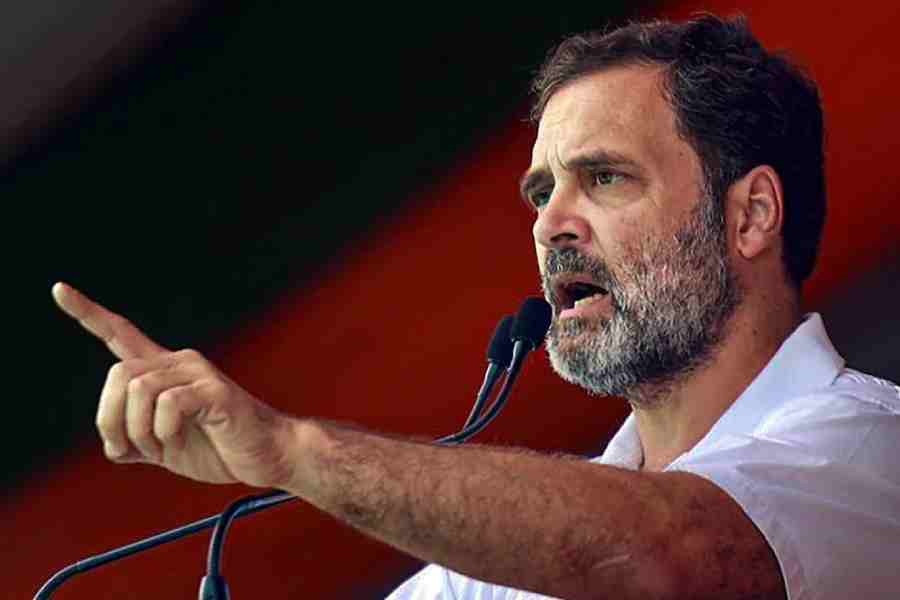Rahul Gandhi has made a subtle intervention in the political discourse on religion, stressing the virtues of compassion and camaraderie, truth and non-violence that constitute the core of Hinduism, contrary to the domineering and violent traits of the Hindutva proponents of the Sangh Parivar.
Although the former Congress president did not refer to the Sangh Parivar or the BJP, his philosophical rumination over Hinduism arose from deep concern at the contemporary challenges posed by the merger of politics with religion.
Rahul wrote: “A Hindu looks at herself and everyone in this ocean of life with love, compassion and respect because she understands we are all swimming and drowning in exactly the same waters. She reaches out and protects all the beings around her who are struggling to swim. She is alert to even the most quiet anxiety, the most silent scream. This action and duty to defend others, especially the weak, is what a Hindu calls her dharma: listening for and acting on behalf of the world’s invisible worries through the prisms of truth and non-violence.”
The Congress leader has tried to explain the difference between Hinduism, a religion, and Hindutva, a political project, on several occasions in the past but a meaningful debate on such a delicate subject is difficult in this age of verbal wrestling and soundbite warfare. So he chose to put his thoughts down on paper.
“She (a Hindu) loves all living beings and accepts that each one of them has the right to choose their own path to navigate and understand the ocean. She loves, respects and accepts all paths as if they are her own,” Rahul wrote.
This is a clear position against divisive politics that thrives on hate and on a focused effort on othering targeted communities and castes.
He wrote: “A person who has the courage to overcome her own fear so that she may observe the ocean truthfully is a Hindu. To call Hinduism a set of cultural norms is to misunderstand it. To bind it to a particular nation or geography is to limit it. Hinduism is how we mitigate and understand our relationship with our fears. It is a path towards the realisation of truth and though it belongs to no one, it is open to anyone who chooses to walk on it.”
As if challenging the Sangh Parivar’s false narrative of “Hindu khatre mein hai”, Rahul wrote: “A Hindu has the courage to look deeply into her own fear and to embrace it. She learns to turn her fear from an enemy into an intimate friend that guides and accompanies her through life. She is not a victim. And never ever allows her fear to capture her and turn her into a vehicle for anger, hatred or violence.”
He continued: “A Hindu knows that whatever knowledge exists, springs from the collective will of the ocean. It is not her property alone. She knows things are constantly evolving in the currents and that nothing ever stands still. She is bestowed with a deep sense of curiosity, one that ensures she never closes her mind to understanding. A Hindu is humble and is always ready to listen and learn from any being that swims in the great ocean.”
Rahul’s short but keenly thought-out essay evoked surprise and even ridicule from some on social media, who objected to such sermons from a politician. Congress communications chief Jairam Ramesh, however, wrote: “Today Rahul Gandhi has truly elevated the public discourse by this deeply personal and thought-provoking piece. This is in keeping with the personality who showed his real self all through the 4,000km Bharat Jodo Yatra.”
Rahul inherits a glorious intellectual legacy in the Congress — Mahatma Gandhi, Jawaharlal Nehru, Sarvepalli Radhakrishnan, Rajendra Prasad, B.R. Ambedkar and other scholarly leaders extensively wrote on religion, philosophy, politics and society. His arguments, revolving around compassion, truth and non-violence, reflect the same school of thought that these intellectual giants represented.
Mahatma Gandhi’s stress on ethical and moral conduct inspired the world and he saw truth and non-violence as an offshoot of that commitment. Nehru wrote in the Discovery of India: “Hindu means a people and not the followers of a particular religion.”
Arguing that “dharma” is an ethical concept that includes a man’s righteousness and responsibilities, he said: “Its essential spirit seems to be to live and let live.”
He also said: “Some kind of ethical approach to life has a strong appeal for me, though it would be difficult for me to justify it logically. I have been attracted by Gandhiji’s stress on right means and I think one of his greatest contributions to our public life has been this emphasis.”
Rahul was reflecting the same sentiment. Nehru also wrote: “A very modern definition of religion, with which the men of religion will not agree, is that of Professor John Dewey. According to him, religion is whatever introduces genuine perspective into the piecemeal and shifting episodes of existence.”
Such arguments provoked the Sangh Parivar to brand Nehru “Western” and “un-Indian” and someone who has no understanding of Hinduism even though India’s first Prime Minister was a towering intellectual.
Many wondered why Rahul was delving into such complicated issues now. But Rahul is probably flagging his understanding of the depth of RSS-BJP propaganda, projecting itself as the sole proprietor-protectors of Hinduism and painting the Congress as anti-Hindu. Little wonder then that he is keen to trigger a debate on the tenets of Hinduism that will establish that the RSS worldview is un-Hindu.











